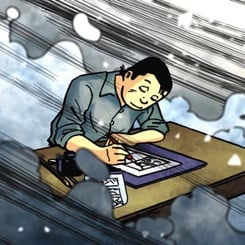Review
by Andrew Osmond,Tatsumi
| Synopsis: |  |
||
The film celebrates the life of pioneering manga artist Yoshihiro Tatsumi. A founding member of the gekiga (“dramatic pictures”) Japanese comics movement, Tatsumi strove to push manga storytelling towards adult subjects and themes. The framing story is Tatsumi's account of his life and development, from his early years as an impoverished child of postwar Japan, to a septuagenarian who still makes manga today. Into this framework are woven five stories from Tatsumi's strips. They're dark, shocking and grimly comic, reflecting Japan's changing landscape and society. |
|||
| Review: | |||
Tatsumi is an unusual film, a manga adaptation which is animated without being anime, made by Zhao Wei Films in Singapore. It's also a fan film, made by a director – former comic artist Eric Khoo – who fell in love with the work of a neglected comic-strip artist and was determined to broadcast it to the world. And for all Tatsumi's problems, this is a fascinating film about a fascinating man. This isn't a film you come to for the animation, which is very rudimentary. There's no attempt to make it look like anime, and anime fans may find it unwatchably stilted. Rather, you come to Tatsumi for its linework and atmosphere; the black streaks of rain over a devastated Hiroshima, the masses pushing onto a crammed Tokyo train, the shifts from black-and-white to summer colours or lurid monochrome hues. Parts of the film are designed to look scratched and blotchy; there are brief moments of stylised beauty which impress at a cost, as they make the viewer wish the film had a bigger budget. Mostly, though, you watch Tatsumi for its stories, which are largely narrated in despairing, gripping voice-overs. There are two main perspectives in the film. One is of Tatsumi the boy growing into a young man, enduring hardships, neglected by his dad, bullied by his sickly older brother… and driven by his need to tell stories in pictures, at a time when manga was marginal. The other perspective is that of Tatsumi the adult author, pouring his anger and frustrations into his stories, imagining himself in twisted guises. These include a cub reporter who makes a shocking discovery in Hiroshima after the bomb; a factory worker unhinged by the pressures of postwar Tokyo; a bitter salaryman on the edge of retirement; and a cast-off manga artist who discovers the pleasures of perversion, obsessing over sex scribbles in public toilets. Tatsumi's tales are spread through the film, breaking up his real life-story. But there's a huge gap in the exposition. Why was Tatsumi motivated to draw dark adult manga, at a time when publishers and pundits saw it as kids' fare? We get the fleeting suggestion that Tatsumi was angered by the economic inequities of the time – something that would resonate today - and that's all. After the probing film portraits of American comic artists like Crumb (about Robert Crumb) and American Splendour (about the late Harvey Pekar), we expect far more profound profiling. The people in Tatsumi's life come into brief focus, like his bitter, bullying elder brother, who then just disappears. The young Tatsumi meets the God of Manga, Osamu Tezuka, whom Tatsumi idolised as a child, but we see few details of the meeting, or how Tatsumi thinks Tezuka shaped him. In compensation, we get a charming account of the young artist's erotic experience with a woman who knows how to sex up a supper. But Tatsumi's life-story has shameless lapses into sentimentality (cue the fireflies!), which feel especially fake next to his gritty fiction. Of his tales adapted in the film, the strongest is the opening Hiroshima story, even if it's easy to guess where it's going. Set amid the black rain and charred corpses of the fall-out, the segment has the flavour of film noir, daring to subvert imagery that's almost sacred to modern Japan. The sour twist wouldn't be out of place in Charlie Brooker's media-baiting TV series, Black Mirror. More sacred cows are butchered in Tatsumi's salaryman story. Here, Tokyo's Yasukuni Shrine is transformed from an icon of nationalist sabre-rattling into a symbol for impotence, as a lonely old man dreams of a last glorious fling. He's perhaps the film's most sympathetic character, which makes his downfall even more cruel. But the young don't have it easier. The factory-worker story shows a man ground down by the miracle of Japan's postwar revival, then literally chewed up. The last story (called “Goodbye”) is the crudest shocker, a nasty vignette about what Occupation meant for Japan's masculinity, as a floozy chases Yanks in uniform. Without a strong context, though, the punchline just feels like a dirty joke. Even more embarrassing is how the film swings from this gross-out to a blandly uplifting farewell to Tatsumi, traducing everything his work stands for. And yet, for all the cloddish compromise, Tatsumi has an adult vision, angry and satirical, covering a tumultuous period of Japanese change about which Westerners know little. Tatsumi is both entertaining and an education; here's to many more films like it. |
|
The views and opinions expressed in this article are solely those of the author(s) and do not necessarily represent the views of Anime News Network, its employees, owners, or sponsors.
|
| Grade: | |||
Overall : B+
Overall (sub) : B+
Story : B
Animation : C
Art : B+
Music : B
+ The five mini-stories adapted from Tatsumi's strips are pungent and engrossing. ⚠ Moderate sex; brief strong violence; mild profanity; portrayal of incest in one segment. |
|||
| Production Info: | ||
|
Full encyclopedia details about |
||